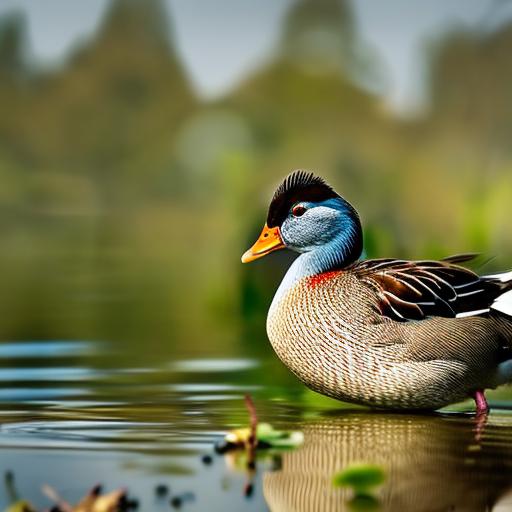Raising backyard poultry has become increasingly popular in recent years, as more people are looking for sustainable and self-sufficient ways to produce their own food. One of the main debates in this realm is whether to raise ducks or chickens. Both animals have their own unique characteristics and benefits, making it a difficult decision for many aspiring poultry keepers.
In this post, we will compare ducks and chickens in terms of space requirements, feeding, water requirements, egg production, noise level, temperament, climate tolerance, and health concerns. By examining these factors, you can make an informed decision about which animal is best suited for your needs and circumstances.
But before we dive into the details, let’s take a moment to appreciate the joy and satisfaction that comes from raising backyard poultry. Whether you choose ducks or chickens, you will be rewarded with fresh eggs, natural pest control, and the opportunity to connect with nature on a daily basis. So let’s explore the differences between these two popular options and help you make the best choice for your flock.
Key Takeaways
- Ducks require more space than chickens.
- Chickens are easier to feed than ducks.
- Ducks need more water than chickens.
- Chickens produce more eggs than ducks.
- Chickens are quieter and easier to handle than ducks.
Space Requirements: Which Animal Needs More Room?
When it comes to space requirements, ducks generally need more room than chickens. Ducks are larger in size and more active than chickens, so they require more space to roam and forage. The recommended square footage per duck is around 10-15 square feet of outdoor space and 3-4 square feet of indoor space. This allows them to exercise their wings and engage in natural behaviors like swimming and dabbling.
Chickens, on the other hand, can thrive in smaller spaces. The recommended square footage per chicken is around 4-5 square feet of outdoor space and 1-2 square feet of indoor space. They are less active than ducks and spend most of their time scratching the ground for food or dust bathing.
If you have limited space available, chickens may be a better option for you. They can adapt well to smaller yards or urban environments, whereas ducks may feel cramped and restricted. However, if you have ample space and are looking for a more active and entertaining flock, ducks can provide a lively and engaging experience.
Feeding: Which Animal is Easier to Feed?
When it comes to feeding, chickens are generally easier to feed than ducks. Chickens have a more varied diet and can thrive on a combination of commercial feeds, kitchen scraps, and foraged insects and plants. They are omnivorous and will eat almost anything you offer them.
Ducks, on the other hand, have specific dietary requirements. They need a balanced diet that includes a higher protein content than chickens. Ducks also require more niacin in their diet to prevent leg problems. While they can eat commercial feeds designed for ducks, they also need access to fresh greens, insects, and aquatic plants.
Feeding ducks can be more challenging and expensive compared to chickens. You need to ensure they have access to the right nutrients and provide them with a varied diet. If you are willing to put in the extra effort and expense, ducks can be a rewarding choice. However, if you prefer a simpler feeding routine, chickens may be the better option.
Water Requirements: Which Animal Needs More Water?
When it comes to water requirements, ducks definitely need more water than chickens. Ducks are waterfowl and have a natural affinity for water. They need access to clean and fresh water at all times for drinking, bathing, and preening their feathers.
Chickens, on the other hand, do not require as much water as ducks. While they do need access to fresh water for drinking, they do not have the same need for bathing as ducks. Chickens will dust bathe in dry soil or sand to keep their feathers clean and free from parasites.
If you have a natural water source like a pond or stream on your property, ducks can thrive in this environment. They will happily swim and forage in the water, which can provide them with additional exercise and enrichment. However, if you do not have access to a water source or are unable to provide a suitable pool for ducks, chickens may be a more practical choice.
Egg Production: Which Animal Produces More Eggs?
When it comes to egg production, chickens are the clear winners. Chickens have been selectively bred for centuries to lay large quantities of eggs. Depending on the breed, age, and health of the chicken, you can expect an average of 4-6 eggs per week.
Ducks, on the other hand, are not as prolific egg layers as chickens. While they do lay eggs, their production is more seasonal and influenced by factors like daylight hours and weather conditions. Ducks also take longer to start laying eggs compared to chickens, usually around 5-7 months of age.
If your main goal is to have a consistent supply of eggs, chickens are the better choice. They are reliable layers and will provide you with a steady stream of fresh eggs throughout the year. However, if you are not concerned about egg production and are more interested in other benefits like pest control or ornamental value, ducks can still be a great addition to your flock.
Noise Level: Which Animal is Quieter?

When it comes to noise level, chickens are generally quieter than ducks. Chickens have a range of vocalizations, including clucking, cackling, and crowing (in the case of roosters). While they can be noisy at times, especially during the morning when they announce the arrival of a new egg, their sounds are generally tolerable and familiar in a suburban or rural setting.
Ducks, on the other hand, can be quite noisy. They have a distinctive quacking sound that can carry over long distances. While some people find the sound of ducks charming and enjoyable, others may find it disruptive or annoying, especially if they live in close proximity to neighbors.
If noise is a concern for you, chickens may be the better choice. They are generally more discreet and their sounds are more easily integrated into a residential environment. However, if you have a large property or live in a rural area where noise is not an issue, ducks can provide a delightful soundtrack to your backyard.
Temperament: Which Animal is Easier to Handle?
When it comes to temperament, chickens are generally easier to handle than ducks. Chickens are more docile and can be easily tamed and handled by humans. They are social animals and can form strong bonds with their owners, especially if they are raised from chicks.
Ducks, on the other hand, can be more challenging to handle. They are generally more flighty and skittish than chickens. Ducks have a strong instinct for self-preservation and may be more prone to panic or flee when approached by humans. However, with patience and gentle handling, ducks can also become accustomed to human interaction.
If you are looking for a pet-like experience and enjoy the idea of interacting with your birds on a regular basis, chickens may be the better choice. They are more likely to enjoy being held and petted, and can even be trained to perform simple tricks. However, if you prefer a more hands-off approach and are content with observing your birds from a distance, ducks can still provide entertainment and enjoyment.
Climate Tolerance: Which Animal is More Resilient to Weather?
When it comes to climate tolerance, ducks are generally more resilient to weather conditions than chickens. Ducks have a thick layer of insulating feathers that protect them from cold temperatures. They also have an oil gland near their tail that produces waterproofing oil, allowing them to stay dry and warm in wet conditions.
Chickens, on the other hand, are more sensitive to extreme temperatures. They are susceptible to frostbite in cold weather and can suffer from heat stress in hot weather. Chickens need a well-insulated coop with proper ventilation to protect them from temperature extremes.
If you live in an area with harsh winters or frequent rain, ducks may be a better choice. They can handle wet and cold conditions better than chickens and are less likely to suffer from weather-related health issues. However, if you live in a moderate climate or are willing to provide the necessary accommodations for chickens, they can still thrive and be productive in various weather conditions.
Health Concerns: Which Animal is More Prone to Illness?
When it comes to health concerns, both ducks and chickens are susceptible to diseases and parasites. However, ducks are generally hardier and more resistant to common poultry illnesses compared to chickens. Ducks have a stronger immune system and are less prone to respiratory infections and internal parasites.
Chickens, on the other hand, can be more vulnerable to diseases like avian influenza and coccidiosis. They are also more prone to external parasites like mites and lice. Chickens require regular monitoring and preventive measures to ensure their health and well-being.
If you are concerned about the health of your flock and want a lower-maintenance option, ducks may be the better choice. They require less intervention and are less likely to suffer from common poultry illnesses. However, if you are willing to invest time and effort into proper care and disease prevention, chickens can still be a healthy and rewarding choice.
Chicken Coop: How to Build the Perfect Coop for Your Flock
Now that we have explored the differences between ducks and chickens, let’s shift our focus to building the perfect chicken coop. A well-designed coop is essential for the safety, comfort, and health of your birds. Here is a step-by-step guide on how to build a chicken coop:
1. Determine the size: Calculate the number of birds you plan to keep and provide at least 4-5 square feet of indoor space per chicken. Consider their future growth and allow for additional space if you plan to expand your flock.
2. Choose the location: Select a location that is well-drained, away from predators, and receives adequate sunlight. Ensure there is enough space for the coop and a run or outdoor area for your birds to roam.
3. Gather materials and tools: Purchase or gather the necessary materials and tools for building the coop. This may include lumber, wire mesh, roofing materials, screws, nails, and basic carpentry tools.
4. Construct the frame: Start by building the frame of the coop using sturdy lumber. Ensure it is level and square to provide a stable structure.
5. Add walls and roof: Attach walls to the frame using screws or nails. Install a sloping roof to allow for water runoff and provide protection from the elements.
6. Install windows and ventilation: Add windows or vents to provide natural light and airflow inside the coop. This will help regulate temperature and prevent moisture buildup.
7. Build nesting boxes: Construct nesting boxes inside the coop where your hens can lay their eggs. Provide one nesting box for every 3-4 hens and line them with clean bedding material.
8. Install roosting bars: Install roosting bars at a height of 1-2 feet above the ground. Chickens prefer to sleep on elevated perches, so ensure there is enough space for all your birds to roost comfortably.
9. Secure the coop: Ensure all openings are covered with wire mesh to prevent predators from entering the coop. Use hardware cloth with small openings to keep out rats, snakes, and other small animals.
10. Provide bedding and nesting material: Add clean bedding material like straw or wood shavings to the floor of the coop. This will provide insulation, absorb moisture, and make cleaning easier.
11. Add feeders and waterers: Install feeders and waterers inside the coop at a height that is easily accessible to your birds. Ensure they are secure and protected from contamination.
12. Create an outdoor run: If possible, provide an outdoor run or fenced area where your birds can safely roam and forage. This will give them access to fresh air, sunlight, and natural food sources.
Remember to prioritize the safety, comfort, and health of your birds when building and maintaining their coop. Regularly clean and disinfect the coop, provide fresh bedding, and monitor for signs of illness or distress. By providing a well-designed and well-maintained coop, you can ensure the happiness and productivity of your flock.
In conclusion, the debate between ducks and chickens is a complex one with no definitive answer. Both animals have their own unique characteristics and benefits, making it a personal choice based on individual preferences and circumstances.
Ducks require more space, more specialized feeding, and more water compared to chickens. They are also less prolific egg layers but can provide entertainment with their lively behavior and charming quacks. Chickens, on the other hand, are easier to handle, require less space and water, and are more reliable egg layers.
When making your decision, consider factors such as available space, desired level of interaction with your birds, climate conditions, noise tolerance, and personal preferences. Ultimately, both ducks and chickens can provide a rewarding experience for backyard poultry keepers.
We hope this article has provided you with valuable insights into the differences between ducks and chickens. Now it’s time for you to make your decision and embark on your own poultry-raising adventure. Don’t forget to share your experiences and opinions with others who may be facing the same decision. Happy poultry keeping!
If you’re considering keeping ducks or chickens, you may be wondering which one is easier to care for. While both have their own unique needs, an article on Poultry Wizard titled “Chicken Coop Run Plans” provides valuable insights into creating a suitable living space for chickens. It offers detailed plans and tips on designing a chicken coop and run that ensures the safety and comfort of your feathered friends. Whether you’re a beginner or an experienced poultry keeper, this article is a must-read for anyone looking to provide the best housing for their chickens. Check it out here.
FAQs
What are the differences between ducks and chickens?
Ducks are aquatic birds that require access to water for swimming and cleaning, while chickens are land birds that do not need water for swimming. Ducks also have webbed feet and bills, while chickens have claws and beaks.
Which animal is easier to keep, ducks or chickens?
It depends on the individual’s preferences and circumstances. Ducks require more space and access to water, but they are generally hardier and less prone to disease than chickens. Chickens are easier to feed and require less space, but they are more susceptible to disease and require more maintenance.
What kind of housing do ducks and chickens need?
Both ducks and chickens need a secure and dry shelter to protect them from predators and the elements. Ducks also need access to a body of water for swimming and cleaning, while chickens do not.
What do ducks and chickens eat?
Both ducks and chickens are omnivores and eat a diet of grains, seeds, insects, and small animals. They can also be fed commercial poultry feed.
What kind of care do ducks and chickens need?
Both ducks and chickens need regular access to clean water, food, and shelter. They also need to be monitored for signs of illness and disease, and may require veterinary care if they become sick. Ducks also need their water source to be cleaned regularly to prevent the growth of harmful bacteria.
Meet Walter, the feathered-friend fanatic of Florida! Nestled in the sunshine state, Walter struts through life with his feathered companions, clucking his way to happiness. With a coop that’s fancier than a five-star hotel, he’s the Don Juan of the chicken world. When he’s not teaching his hens to do the cha-cha, you’ll find him in a heated debate with his prized rooster, Sir Clucks-a-Lot. Walter’s poultry passion is no yolk; he’s the sunny-side-up guy you never knew you needed in your flock of friends!







